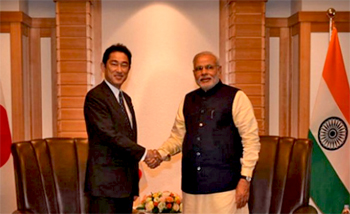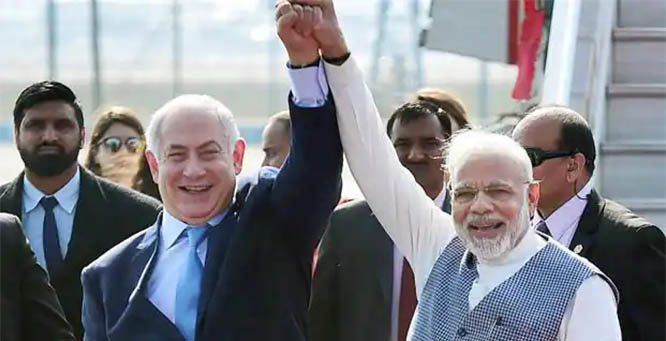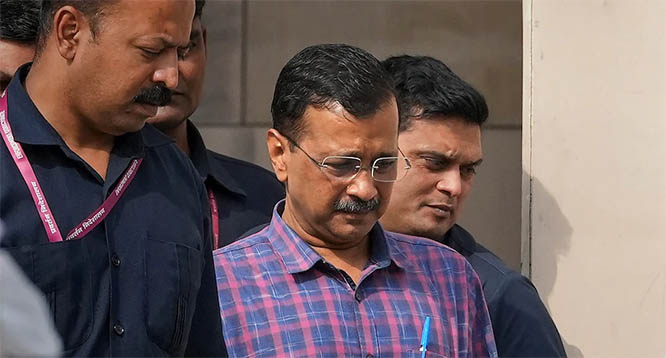Kyoto, Sep 1: With India and Japan now talking of a new chapter in their global and strategic ties, Prime Minister Narendra Modi today begins the second leg of his five-day Japan visit - to convince the country to 'make in India and invest in India'.

India and Japan are already in talks for the high speed train between Mumbai and Ahmedabad, and Japan has already invested in the Delhi-Mumbai industrial corridor and the western freight corridor.
On Monday, Modi will be accorded a ceremonial welcome followed by summit-level talks in which the two sides will seek to take their strategic partnership to a new level. Agreements are expected to be signed in defence and the two sides will discuss cooperation in infrastructure, civil nuclear energy and production of rare earth materials.
Commerce minister Nirmala Sitharaman told The Telegraph: “We are asking for greater access to their market so that Indian goods such as gems and jewellery, pharmaceuticals and textiles can be exported.”
According to the report, the Indian pharma industry, whose growth has slowed down to 1.2 percent at $14.84 billion last financial year, has been trying to prise open the tightly controlled Japanese drug market.
The two countries will also agree to jointly produce mixed rare earth, with Japan set to start importing from India in 2015 as it tries to wean itself of its reliance on China.
Indian Rare Earths, a wholly-owned subsidiary of the Department of Atomic Energy, and Japanese trading house Toyota Tsusho will sign a contract on joint production as early as September, according to the Nikkei Business Daily.
Annual production will be about 2,000 tonnes to 2,300 tonnes, equal to around 15 percent of Japan's demand, and roughly 2,000 tonnes a year could be exported to Japan starting as early as February, it added.
The Indian company will make mixed rare earth materials from uranium and thorium ores, which Toyota Tsusho will use to produce neodymium for electric and hybrid cars, as well as lanthanum, cerium and praseodymium
Modi is also likely to lobby for Abe to back a nuclear energy pact, although hopes of striking a similar accord to one reached with the United States in 2008 had faded in the run-up to the visit.
Japan wants explicit guarantees from India, which has not signed the nuclear non-proliferation treaty, to limit atomic tests and allow closer inspection of its facilities to ensure that spent fuel is not used to make bombs.
Modi will also seek to drum up the inward investment he needs to bring to life the appeal to "Come, make in India" he made in a speech this month to mark India's independence day.
Also under discussion will be a proposal to formalise a 'Two Plus Two' format for talks bringing together the foreign and defence ministers of both countries, reflecting shared concerns about an increasingly assertive China.
Other items on the agenda include negotiations for the US-2 amphibious rescue and reconnaissance plane, investments in desalination plants and the Japanese bullet train.
Japanese Prime Minister Shinzo Abe, who, in a special gesture, received Modi in Kyoto, tweeted Sunday: “"Looking forward to seeing PM Modi again in Tokyo tomorrow."
"Will begin the day tomorrow (Monday) with a visit to Taimei elementary school followed by meetings, address at a Business Luncheon and tea ceremony," Modi tweeted on his part.
On Sunday, the first full day of his five-day trip to Japan, Modi also exchanged notes on heritage conservation with Kyoto Mayor Daisaku Kadokawa, showing him a detailed map of Varanasi, the Hindu holy city he represents in the Lok Sabha.
Modi, who arrived in Kyoto Saturday, began Sunday by visiting the Toji and Kinkaku-ji temples. Dressed in a white kurta pyjama and bandhgala, Modi first went to the Toji temple with Abe.
Abe guided Modi around the Toji temple to take a look at its Buddhist statues and five-storied pagoda, which is a national treasure, Kyodo news agency reported. Modi also walked through the temple premises.
Modi and Abe then met for about 90 minutes. The meeting was described by Indian officials as "exceptionally warm and friendly". Within hours of Modi's arrival, a partnership accord was signed between Varanasi and Kyoto.
This is Modi's first bilateral sojourn outside South Asia since taking office in May. On Tuesday, he will call on Japanese Emperor Akihito.








Comments
Add new comment